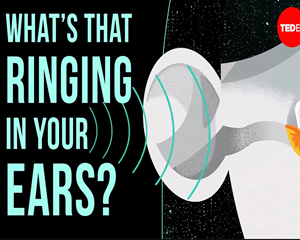Arriving home after a long day, you settle in for a quiet evening alone.
在辛苦了一天回家后,你准备独自享受一晚的安宁。
But instead of the sound of silence, you hear a constant ringing -- even though there's nothing making any noise.
但你听到的却不是寂静,而是持续不断的响铃声--即使没有任何东西在发出噪音。
What you're experiencing is called tinnitus, the perception of a noise like ringing, buzzing, hissing or clicking that occurs without any external source of sound.
你正在经历的是“耳鸣”,一种即使没有外界声源,也仍能感知到铃声、嗡嗡声、嘶嘶声或敲击声等噪音的现象。
Tinnitus has been bothering humanity since Ancient Babylon, plaguing everyone from Leonardo da Vinci to Charles Darwin.
从古老的巴比伦开始,耳鸣就已经困扰着人类,从达·芬奇到查尔斯·达尔文,都深受其害。
Today, roughly one in seven people worldwide experiences this auditory sensation. So where does this persistent sound come from?
今天,大概世界各地每七个人中就会有一个会经受这种听觉感知。那么,这种持续的声音是从何而来的?
When you normally hear something, sound waves hit various areas of your ear, creating vibrations that displace fluid inside the cochlea.
当你平时听到声音时,声波会击中你耳朵的各个区域,产生振动,使耳蜗内的液体发生位移。
If the vibrations are large enough, they elicit a chemical response that transforms them into bioelectrical signals.
如果振动足够大,就会引起化学反应,将其转化为生物电信号。
These nerve impulses are then relayed through the hearing pathway to the brain, where they result in the sounds we perceive.
这些神经冲动随之便通过听觉通路传递到大脑,然后变成我们听到的声音。
However, in the vast majority of tinnitus cases, the nerve signals that produce these mysterious sounds don't travel through your ear at all.
然而,在大部分的耳鸣案例中,产生这些神秘声音的神经信号根本就没有经过你的耳朵。
Instead, they're generated internally, by your own central nervous system.
相反,它们是在你自己的中枢神经系统内部产生的。
Under usual circumstances, these self-produced signals are an essential part of hearing.
在通常情况下,这些身体自我产生的信号是听觉重要的组成部分。
All mammals demonstrate on-going neural activity throughout their hearing pathways.
所有哺乳动物的听觉通路里都会有持续的神经活动。
When there are no sounds present, this activity is at a baseline that establishes your neural code for silence.
在没有外界声音的情况下,这种神经活动处于基线水平,建立了无声状态的神经编码。
When a sound does appear, this activity changes, allowing the brain to distinguish between silence and sound.
当一个声音出现时,这个神经活动就会改变,能让大脑区分无声和有声。
But the auditory system's health can affect this background signal.
但是听觉系统的健康会影响到这个背景信号。
Loud noises, diseases, toxins, and even natural aging can damage your cochlear cells. Some of these may heal in a matter of hours.
巨大的噪音、疾病、毒素,甚至自然衰老都会损伤你的耳蜗细胞。有些细胞可能在几个小时内就会痊愈。
However, if enough cells die, either over time or all at once, the auditory system becomes less sensitive.
然而,如果有太多的细胞死亡,无论是随着时间逐渐死亡,还是全部同时死亡,听觉系统就会变得没那么敏感了。
With fewer cochlear cells relaying information, incoming sounds generate weaker nerve signals.
因为传递信息的耳蜗细胞越来越少,传入的声音产生的神经信号就会变弱。

And many environmental sounds can be lost completely.
许多环境声音可能会完全听不见。
To compensate, your brain devotes more energy to monitoring the hearing pathway.
为了弥补,你的大脑会投入更多能量来监控听觉通路。
Just like you might adjust the knobs of a radio, the brain modifies neural activity while also tweaking the tuning knob to get a clearer signal.
就像你可以调整收音机的旋钮,大脑也会调整神经活动,同时也调节旋钮以获得更清晰的信号。
Increasing this background neural activity is intended to help you process weak auditory inputs.
增加这种背景神经活动原本是为了帮助你处理微弱的声音。
But it can also modify your baseline for silence -- such that a lack of sound no longer sounds silent at all.
但它也能改变你的无声状态基线--以至于“没有声音”听起来不再是无声的。
This is called subjective tinnitus, and it accounts for the vast majority of tinnitus cases.
这叫做“主观性耳鸣”,并且占了绝大多数的耳鸣病例。
Subjective tinnitus is a symptom associated with practically every known ear disorder, but it isn't necessarily a bad thing.
几乎所有已知的耳朵相关疾病都会有主观性耳鸣的症状,但这不一定是件坏事。
While its appearance can be surprising, subjective tinnitus has no inherently negative consequences.
虽然它的出现令人惊讶,但主观性耳鸣本身并没有负面的后果。
But for some, tinnitus episodes can trigger traumatic memories or otherwise distressing feelings, which increase the sound's intrusiveness.
可对一些人来说,耳鸣会触发创伤的记忆或者其他痛苦的感觉,两者都会增加这种声音的侵扰性。
This psychological loop often leads to what's known as "bothersome tinnitus," a condition that can exacerbate the symptoms of PTSD, insomnia, anxiety, and depression.
这种心理循环往往会导致所谓的“困扰性耳鸣”,这种病症会加剧创伤后应激障碍、失眠、焦虑和抑郁的症状。
There's no known cure for subjective tinnitus.
主观性耳鸣目前还没有已知疗法。
So the most important thing doctors can do is help people understand this auditory event, and develop neutral associations with these often-distressing sounds.
所以,医生能做的最重要的事情是帮助人们了解这种听觉现象,并且针对这些令人烦恼的声音建立有中和作用的关联。
For example, sound therapy uses noises like rain, birdsong, or music to mask tinnitus and reduce stress.
比如,声音疗法会运用如雨声、鸟鸣或者音乐等杂音来掩盖耳鸣,减轻压力。
One form, called informational masking, uses soothing, complex auditory signals that distract the brain from the tinnitus sound.
有一种叫做信息掩蔽的疗法,使用舒缓、复杂的听觉信号来分散大脑对耳鸣的注意力。
Another, called energetic masking, uses sounds with the same frequency as the patient's tinnitus to occupy the neurons that would otherwise deliver the tinnitus signal.
另一种疗法,叫做能量掩蔽,使用与患者耳鸣频率相同的声音来占用原本会传递耳鸣信号的神经元。
Practiced alongside counseling, these interventions allow people to re-evaluate their relationship with tinnitus.
这些干预措施与心理咨询同时进行,能让人们重新评估他们与耳鸣的关系。
Losing the sound of silence can be troubling to say the least.
可以说,失去寂静之声非常令人烦恼。
Tinnitus reveals that your brain is constantly analyzing the world around you, even as it fails to filter its own internal noise.
耳鸣揭示了即使你的大脑无法过滤自身的杂音,也仍在不断地分析你周围的世界。
In a sense, experiencing tinnitus is like eavesdropping on your brain talking to itself -- though it may not be a conversation you want to hear.
从某种意义上说,听到耳鸣就像是偷听到大脑的自言自语--不过这可能不是你想听到的谈话。












